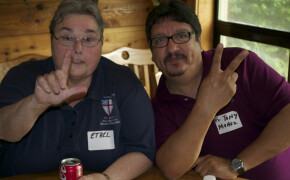Clergy Conference Spring 2016

The Rev. Ethel Channon, vicar of St. Mark's in Mount Plesant, and The Rev. Tony Munoz, assisting priest at St. Matthew's Cathedral in Dallas hanging out at the Clergy Conference.
Dr. Alan Jacobs' lecture on sin -- Part one
Dr. Alan Jacobs' lecture on sin -- Part two
The Rev. Fleming Rutledge's lecture on sin
More than 120 clergy from the Episcopal Diocese of Dallas gathered for a three-day conference of prayer, fellowship, theology and reflection at Camp Allen near Houston, in the Diocese of Texas.
The annual gathering provides a unique opportunity for priests and deacons to spend time together for three days in a relaxed setting. It’s important to bring our clergy family together once a year so they can get to know one another and talk about their common vocation, said the Rev. Mary Lessmann, who is an assisting priest at Saint Michael and All Angels. “There is something special when we all are present together – just being with each other and catching up. It’s really a great time.”
Conference speakers, Dr. Alan Jacobs and the Rev. Fleming Rutledge centered their topics on the conference theme of Sin and the Contemporary Mind. “It will be a little odd to say you think about sin and depravity,” Bishop George Sumner told the group. “If theology isn’t first-of-all practical, it never-the-less has certain practical implications. The topic we are reflecting on these two days goes straight to the people we talk to.”
Jacobs grabbed the group’s attention when he talked about the sin of spending too much time on technological devices instead of praying and reflecting on God.
“Our eco-system of interruption technologies affects our spiritual and moral lives in every aspect. By our immersion in that eco-system we are radically impeded from achieving a right understanding of ourselves and of God’s disposition toward us. We do not understand ourselves as sinners, or as people made in God’s image, or as people spiritually endangered by wondering far from God, or as people made to live in communion or fellowship with God… .,” Jacobs said. “If we cannot cease for a few moments, from an endless procession of stimuli that shock us out of thought approximately 190 times every 15 minutes, we are not going to be able to grasp these things and make them real and effectual in our lives.”
Jacobs told the room of priests and deacons that it is their duty to help their congregants become disciplined about prayer and reflection. “People will not want to admit how addicted they are to the affirmation of others,” he said. “They will not readily admit how much they crave distraction in order to avoid self-examination. It’s not easy to admit.”
The Church is a consciously counterculture place in this world, and clergy should use the more contemplative pieces of the Book of Common Prayer to help train people in contemplative practices, he said. We need “to get people to be reflective about being afraid of silence, being afraid of disconnection and being addicted to stimuli from these devices. That has be confronted and dealt with.”
Judy Frizzell, who is a deacon at Church of the Incarnation in Dallas, said the lecture about the sins of addiction to technology resonated with her. “We have all been aware of the threat of technology, but it has been so beautifully and fully explained, and the remedy is hopeful,” she said.
Rutledge, who is the author of “God Spoke to Abraham: Preaching From the Old Testament,” gave two lectures, titled, “Sin as Good News” and “Talking about Sin in the Third Millennium.”
Rutledge spoke about the Good News of prevenient grace, noting that God’s grace is already active in one’s life. “Christ took into himself the very worst and on the third day demonstrated that the very worst was no match from him,” she said.
Rutledge’s message to the clergy was enlightening, said the Rev. Samira Izadi Page, Executive Director of Gateway of Grace. “That’s one of the most hopeful realities that enable us to acknowledge our sinfulness and yet we all grow spiritually.”
The conference structure also included some downtime that allowed for fellowship for those relaxing in the camp’s scenic outdoor areas, or during a soccer match between high-church and low-church clergy. (Unsubstantiated reports named the high-church clergy as the winners.) Other activities included skeet shooting, which was “won” by the Rev. Will Brown, rector of Holy Cross in Dallas.
The conference also included morning and evening prayer, and a service with Holy Communion. There were also impromptu musical sessions late at night when folks were gathered in outdoor spaces playing their instruments and singing.
Mark Hall, who is a Deacon at St. Matthew’s Cathedral, said the conference was a good break from the daily routine and a chance to connect with others in ministry. “I really enjoyed getting to know my fellow clergy members better in a relaxed setting,” he said. “The planning for this event was great because there was a good balance of time for prayer and meditation, but also to enjoy fellowship.”
The Rev. Betsy Randall, an associate rector at Epiphany in Richardson, said she enjoyed the conference and spending time in prayer, lecture and fellowship with the other clergy. “I just walked past a group playing the guitar. It’s just been wonderful. I’m so grateful.”

